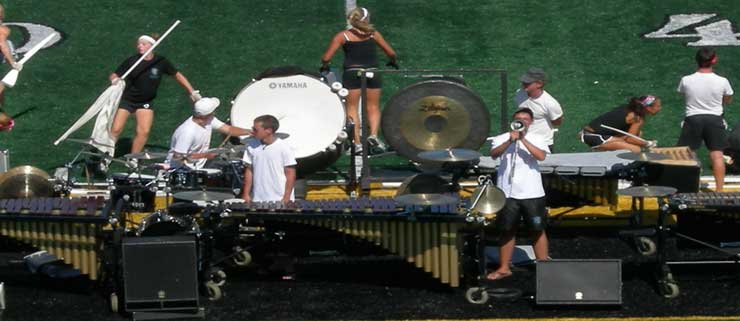.jpg) Practice makes perfect. These three words are heard every day and time after time these words are ignored. But why? Music is such a vast subject that for anyone, even the professionals, mastering it is near impossible. With years of work one can be very knowledgeable in specific areas of music but it would take more than a lifetime to fully understand every aspect of an instrument or music theory.
Practice makes perfect. These three words are heard every day and time after time these words are ignored. But why? Music is such a vast subject that for anyone, even the professionals, mastering it is near impossible. With years of work one can be very knowledgeable in specific areas of music but it would take more than a lifetime to fully understand every aspect of an instrument or music theory.
{mosimage}Practice makes perfect. These three words are heard every day and time after time these words are ignored. But why? Music is such a vast subject that for anyone, even the professionals, mastering it is near impossible. With years of work one can be very knowledgeable in specific areas of music but it would take more than a lifetime to fully understand every aspect of an instrument or music theory.
With that in mind hopefully people should start to understand that having a one hour lesson once a week is not even close to enough to gain substantial progress and development on a musical instrument.
This series of articles offer tips on practicing music which will hopefully demonstrate the benefits, enjoyment and fulfilment that can be gained through practicing music.
1. Goals are key. It is human nature to take pride in reaching a goal whether a promotion at work or winning a competition. If you have a set goal to reach you will be more willing to put in the work required to achieve it. Some examples of goals could be to learn the latest song you’ve fallen in love with, to be able to sight read in a certain key, to develop faster, more technical playing or to reach a certain exam grade before a certain period.
2. Little often is better than a lot occasionally. One key point to remember is that repetition is the quickest way to learn something due to your brain and muscles ability to develop and store a so called ‘muscle memory’. It will take a substantially longer time to learn and retain your new knowledge if you practice for a long period but only occasionally. See tip 3 on how to easily incorporate regular practice sessions into your daily routine.
Another benefit of practicing a little often is that your concentration levels are kept up throughout your practice session. Brass players will understand this the most – after playing a trumpet or any brass instrument for approximately an hour your lips start to feel numb which in turn begins to restrict your playing abilities. The knock on effect of this is that the longer you practice without a break, the more harm ultimately you will cause yourself – both mentally and physically – it will knock your spirit and could even do damage to your embouchure. Obviously this applies to all instrument groups; as is well documented repetitive strain injury is common among musicians. The primary cause of this is improper technique but as the name implies too much repetition through a movement can create serious effects. Therefore if you are practicing for longer periods be sure to take regular breaks – 5 to 10 minutes for every 50 minutes for adults and 10 to 15 minutes for every 25 minutes for children.
3. Routine. Imagine this – every morning you wake up, maybe make a cup of coffee or sort through the post and eventually at some point you will go to the sink and brush your teeth. Now most people do this without any thought – it is just something that gets done. This is the effect of getting into a routine. If you set aside a time each day to practice, away from distractions if possible, you will get into this routine making it much easier to practice, it becomes a part of your day to day life.
4. Practice with a partner. Most humans love competition – especially if you know you are the winner – and by tapping into this you’re making your practice session less of a chore and more of a game. Set challenges between you both and find some reward for the winner. The other benefits are that you gain an outsiders opinion and criticism on your playing, the opportunity to practice duets and you will have some company rather than being locked away in your bedroom.
This is just a glimpse at the different methods you can adopt to improve your practice and in the next article I will demonstrate some more music based tips to help you improve; using a metronome to develop your internal body clock, a fun method for scales and arpeggios and how and why you should be incorporating sight reading and music theory into your practice sessions.
For now just focus on your desires and on the reasons why you started music and give the tips above some thought.
About The Author:
Edward Droscher is the founder of Real Music Production and works to develop music education systems privately and in schools. For more information or details on music instruction please visit http://www.realmusicproduction.com or email This email address is being protected from spambots. You need JavaScript enabled to view it.







 Scroll down to view the comparison chart of over a dozen different portable digital audio recorders.
Scroll down to view the comparison chart of over a dozen different portable digital audio recorders.